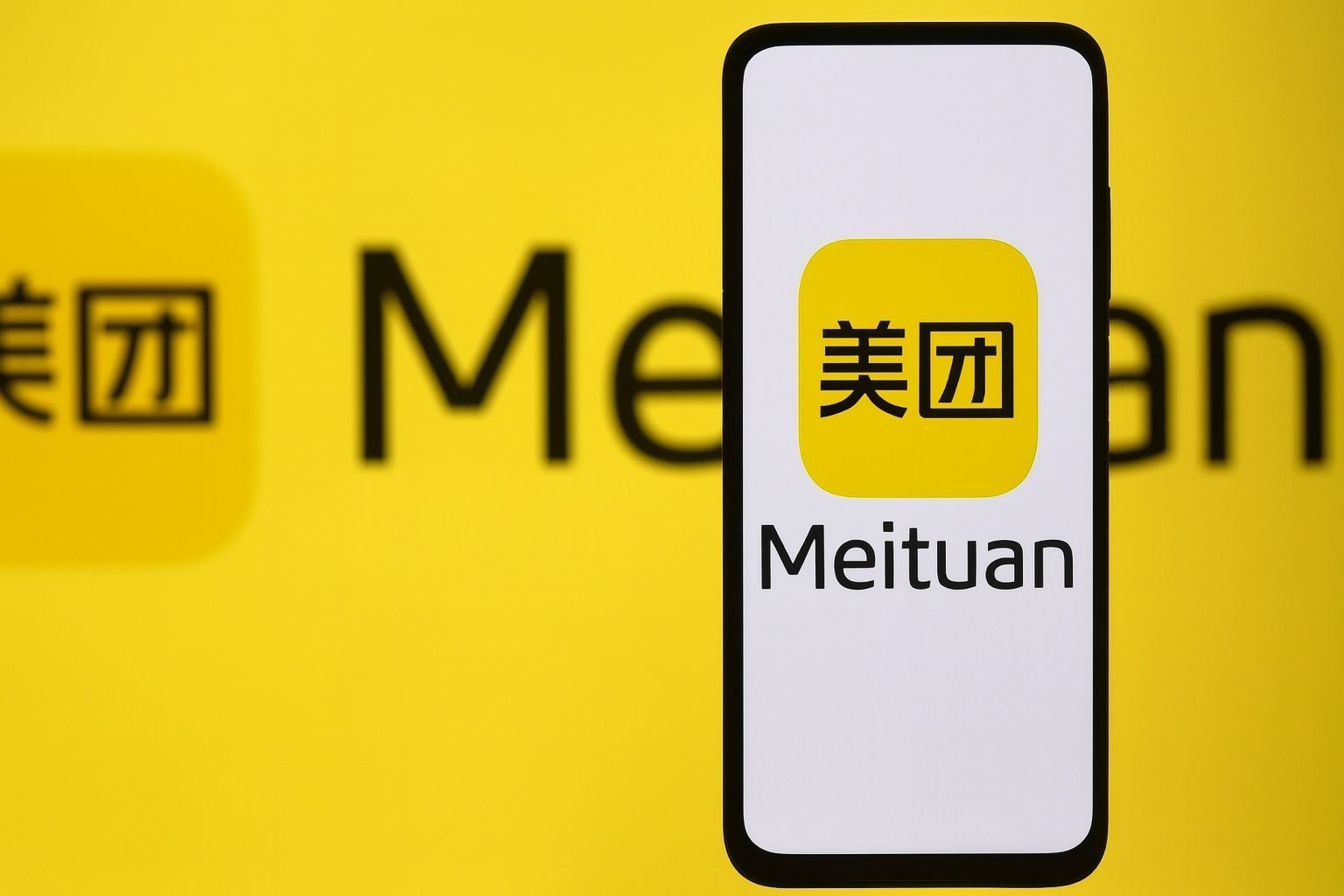- Stock Price (Oct 23, 2025): HK$100.00, up +4.06% on the day investing.com. After a mid-Oct dip (low HK$94.05 on Oct 17 investing.com), the stock has rebounded this week. Its 52-week range is HK$94.05–205.40 investing.com, far off last year’s peak (~HK$205).
- Business: China’s largest on-demand services “super app,” leading food delivery (~70% market share economictimes.indiatimes.com), instant retail (groceries, essentials), hotel and travel booking, plus bike-sharing and maps.
- Recent Results: In Q2 2025, Meituan’s profit plunged 89% YoY amid fierce price wars economictimes.indiatimes.com. The company has since vowed to improve rider welfare – e.g. scrapping late-delivery fines by end-2025 sixthtone.com chinadaily.com.cn – and is expanding overseas (e.g. new Keeta markets in the Middle East and a US$1B Brazil fund economictimes.indiatimes.com).
- Innovation: In Sept 2025 Meituan released LongCat-Flash-Chat, a 560B-parameter open-source AI language model scmp.com. This “LongCat” LLM is now on par with Alibaba’s and Western models and free on Hugging Face/GitHub scmp.com venturebeat.com. The company says it’s investing “billions” in AI and related chips venturebeat.com.
- Retail Expansion: Meituan has launched “Happy Monkey” supermarkets (10 stores planned in 2025) to compete in offline retail chinaskinny.com chinaskinny.com. It leverages its delivery network and consumer data to offer deep discounts (15–20% below market) in a hard-discount format.
- Competition: Rivals include Alibaba (Ele.me food delivery, Hema retail), JD.com (food delivery/business expansion), Pinduoduo (Duoduo Grocery) and newcomer ByteDance. ByteDance’s Douyin app is now merging its Douyin Supermarket with its Hourly Delivery service to challenge Meituan, Alibaba and JD in “instant commerce” scmp.com.
- Analyst Outlook: The average 12-month price target is ~HK$119.7 (≈+24% upside) tipranks.com, reflecting cautious optimism. Most analysts rate Meituan as a “Hold” or “Buy.” Consensus drivers include China’s consumer recovery (e.g. travel/bookings) and Meituan’s tech push, versus risks from ongoing subsidy wars and macro/headwinds reuters.com ts2.tech.
Stock Performance and Market Snapshot
On Oct 23, 2025 Meituan’s stock (3690.HK) closed at HK$100.00 investing.com. After falling to HK$94.05 on Oct 17 (its 52-week low) investing.com, the shares have bounced. The recent rally pushed the price near the lower end of its 52-week range (HK$94–205 investing.com). Year-to-date, the stock has lagged some peers, reflecting a tough market.
In the past week Meituan gained ~4% in Hong Kong, helping it outperform the Hang Seng Tech Index, which dipped amid US-China trade-war jitters. Analysts note that Hong Kong tech stocks saw a broad pullback in mid-Oct, but remain up ~30% YTD on strong 2025 momentum ts2.tech ts2.tech. Meituan’s rebound reflects both this broader market strength and company-specific catalysts (see below).
Food Delivery & Instant Retail (Price Wars)
Meituan’s core food-delivery business remains its cash cow, but margins are under strain. In full-year 2024, Meituan’s revenue jumped to 337.6 billion yuan (from 276.8b in 2023) and net profit more than doubled reuters.com. Management pledged to “expand investments in cutting-edge technologies” such as AI and unmanned delivery vehicles to drive efficiency reuters.com. Nevertheless, in Q2 2025 the company warned that its adjusted net profit fell 89% YoY, blaming a brutal subsidy war in instant retail economictimes.indiatimes.com.
Competition has reached a fever pitch. Meituan CEO Wang Xing said Q2 saw a “new phase of intense competition” reuters.com. ThirdBridge analyst Jamie Chen warns that “China’s food delivery sector has entered a full-scale delivery war… this is a battle Meituan cannot afford to lose” economictimes.indiatimes.com. All major players are flooding the market with discounts: Reuters reports that Meituan, Alibaba and JD have pledged billions of dollars to defend market share reuters.com. S&P Global analysts estimate they will burn ¥160 billion more over the next 12–18 months on subsidies reuters.com, and they predict this will “significantly” hurt profits for 1–2 years. By their reckoning, Meituan may suffer most since food delivery is its largest revenue source reuters.com.
Regulatory pressure is mounting too. In July 2025 Chinese regulators warned platforms against a “race to the bottom” and forced Meituan, Alibaba and JD to pledge a truce on price wars. Moody’s analyst Ying Wang expects these commitments, along with the upcoming Anti-Unfair Competition Law (effective Oct 15, 2025) chinaiptoday.com, to gradually “rationalize competitive dynamics.” In practice, Meituan is already easing rider rules: it is phasing out late-delivery fines by end-2025 sixthtone.com chinadaily.com.cn and has expanded a point-based evaluation system for couriers, improving driver welfare.
Travel & Tourism Boost
Meituan’s travel business has been a bright spot. The platform’s data show that during the Oct 1–8 Golden Week holiday, travel and hotel bookings surged over 30% year-on-year news.futunn.com. Domestic tourism has rebounded strongly: popular destinations (Nanjing, Chengdu, Xi’an, etc.) all saw big gains news.futunn.com. This has driven higher demand for transportation, accommodation and tour packages. Meituan’s hotel booking GMV hit record highs in Q2, according to industry reports, as Chinese consumers took long-distance trips news.futunn.com.
Healthy travel volumes help offset weakness elsewhere. With millions of users on Meituan Travel and Dianping, the company benefits when consumers book flights, trains, hotels or experiences. Senior analysts note that China’s overall travel market grew ~5.5% in 2024 and should continue climbing as living standards rise. Meituan is even partnering with global players (e.g. Agoda) to tap outbound travel. In short, robust holiday spending is a near-term catalyst for Meituan’s services segments.
Offline Retail Expansion: “Happy Monkey” Stores
Meituan is extending its e-commerce war into physical retail. In August 2025 it quietly launched “Happy Monkey” (快乐猴), a hard-discount supermarket brand. The first stores opened in Hangzhou and Beijing, offering 1,000–1,200 SKUs of groceries and household goods at 15–20% below market prices chinaskinny.com. The concept draws on Meituan’s “community retail” experiments (Xiaoxiang Supermarket, Youxuan), using its logistics app and local data to optimize inventory and deliveries.
Analysts say Happy Monkey is Meituan’s play to challenge Alibaba’s Hema and JD’s 7Fresh in offline grocery. The plan is aggressive: Meituan intends to open 10 stores by end-2025, with a goal of 1,000 nationwide in the long run chinaskinny.com. Early store designs emphasize large pack sizes, strong private labels (up to 60%), and lean staff. By blending in-store shopping with app-based ordering and delivery, Meituan hopes to win budget-minded shoppers. For investors, success in this “new retail” push could diversify Meituan’s revenue beyond online services.
AI and Tech Initiatives
Meituan is making headlines for its AI moves. On Sep 1, 2025 it released LongCat-Flash-Chat, a 560-billion-parameter open-source large language model (LLM) scmp.com. The model – trained on a Mixture-of-Experts architecture – reportedly matches Alibaba’s Qwen3 and even Google’s Gemini 2.5 on benchmarks scmp.com. Just weeks later Meituan unveiled LongCat-Flash-Thinking, a variant optimized for complex reasoning venturebeat.com. All LongCat models are MIT-licensed and freely available via Hugging Face and GitHub, signaling Meituan’s intent to become an AI platform as well as a services app.
These AI efforts are not just for show. Meituan acquired AI startup Light Year (Beijing) in 2023, and now plans to deploy AI across its ecosystem – from smarter search to logistics optimization. For example, Meituan said it will start using AI in its rider support channels to speed up complaint handling sixthtone.com. The technology push is in line with management’s stated strategy: earnings reports highlight “billions” in AI and chip investment, aiming to give Meituan an edge in data-driven personalization and efficiency venturebeat.com. In the current AI arms race among Chinese tech giants, Meituan is clearly positioning itself as a contender beyond just local services.
Competitive Landscape and Regulations
Beyond Alibaba and JD, a major new rival is ByteDance (Douyin). In mid-2025 Douyin merged its supermarket and delivery units, aiming to convert its 800m+ video users into instant-delivery customers scmp.com. This escalates the e-commerce skirmish. Pinduoduo (PDD) has been a bit quieter, but it too is eyeing grocery delivery through Duoduo Grocery and partners.
On the regulatory front, Beijing’s stance has softened on big tech. The worst of the 2021–22 antitrust blitz is past, and authorities now want tech to fuel growth. However, they remain wary of predatory practices. Apart from urging an end to price wars, regulators have been drafting tougher rules: notably, a revised Anti-Unfair Competition Law will take effect Oct 15, 2025 chinaiptoday.com. The new law explicitly bans using algorithms or misleading marketing to distort competition. Meituan and peers now must ensure their promotions and user interfaces comply with stricter “fair play” rules. Investors will be watching regulators closely for any new edicts on data use, platform monopolies, or consumer rights.
Analyst Forecasts & Expert Commentary
Analysts are mixed but cautiously optimistic. TipRanks reports an average 12-month price target of HK$119.7 tipranks.com (about +24% from current levels), based on 13 broker estimates (6 Buy, 4 Hold, 3 Sell). Those bullish on Meituan cite its dominant market position, strong balance sheet (net cash), and growth prospects in under-penetrated local services. For example, many funds see Chinese internet stocks as undervalued given future AI/cloud tailwinds ts2.tech.
Commentators note potential catalysts like China’s policy support and pent-up consumer demand. But they also warn that markets remain volatile. A recent market note observed that Hong Kong tech stocks could see a short-lived pullback: “volatility will remain high into October… but any downturn should be limited by liquidity and policy support” ts2.tech. U.S.-China trade headlines are another wild card – a single news blast (like looming tariffs) could knock 10–15% off major names ts2.tech. As one strategist quipped, the current dip is more of a “profit-taking party” than a panic ts2.tech.
Among individual forecasts, some banks have target ranges from HK$77 (bear-case) to HK$164 (bull-case) tipranks.com. Forecasts hinge on Meituan’s ability to turn its tech initiatives into revenue, and on how quickly it reigns in subsidy spending. Investors will watch upcoming results (including the Q3 earnings expected in Nov) and key events like Singles Day (Nov 11) for signs that Meituan can reignite growth.
Catalysts & Risks for Investors
Catalysts: A recovery in Chinese consumer spending would boost Meituan’s core volumes. Continued travel/tourism growth (as seen in Golden Week news.futunn.com) and any pick-up in dining out could lift order counts. Meituan’s push into AI and new services is another growth driver: for example, if LongCat-based tools improve ad targeting or logistics, that could enhance revenue and margins. Successful expansion of Happy Monkey stores or other retail experiments could also open new revenue lines. Finally, any easing of competition (through government intervention or natural consolidation) could improve pricing power.
Risks: The subsidy war remains the biggest overhang. If competitors refuse to fully withdraw promotions, Meituan may have to keep burning cash (see UBS’s “game of chicken” warning reuters.com). Slower-than-expected sales or margin recovery could lead to more analyst downgrades. Regulatory changes – beyond the anti-competition law – could also bite. For instance, new rules on pricing disclosures or user data could hamper some business practices. Externally, a renewed US-China trade confrontation or a broader Chinese economic slowdown would depress consumer demand. As one expert put it, “companies with high multiples… do not persevere if they do not perform” ts2.tech, so Meituan must deliver on its growth narrative.
Sources: Company reports and filings, Reuters, SCMP, Economic Times, China Daily, Sixth Tone, VentureBeat, TS2.Tech, TipRanks, and others economictimes.indiatimes.com news.futunn.com chinaskinny.com scmp.com reuters.com chinaiptoday.com ts2.tech.









